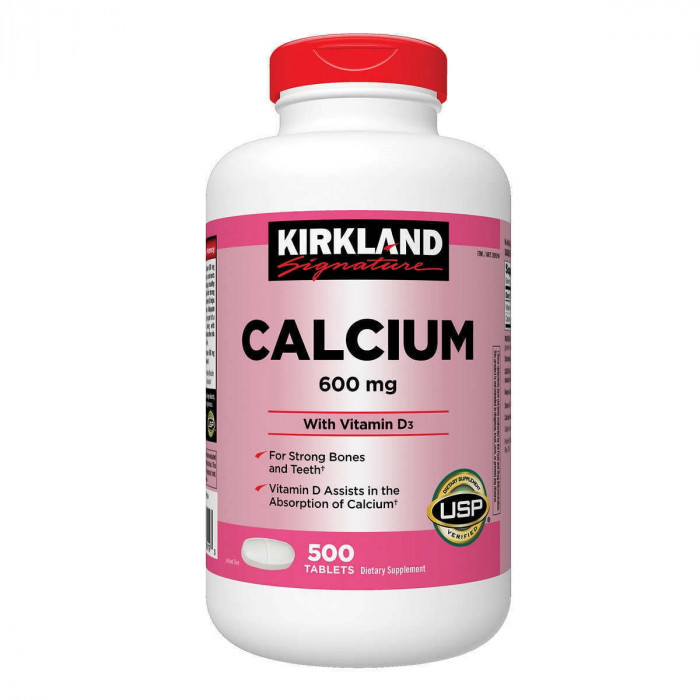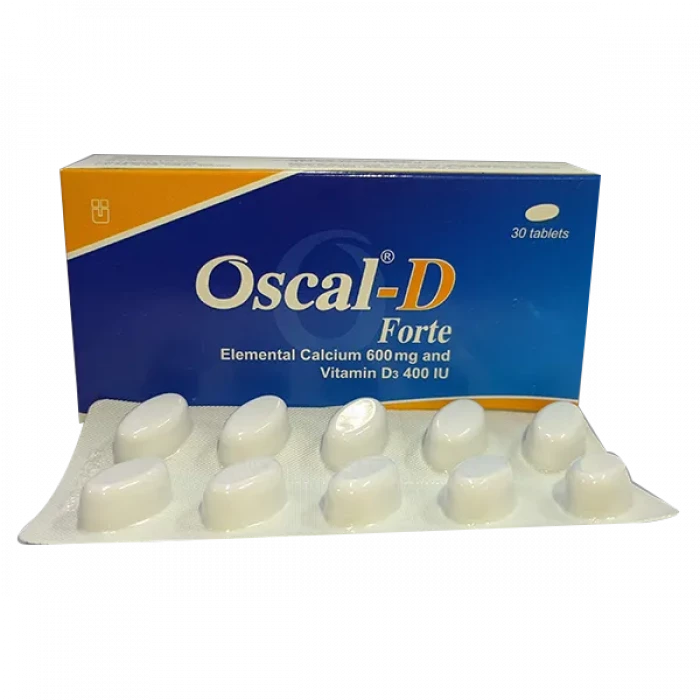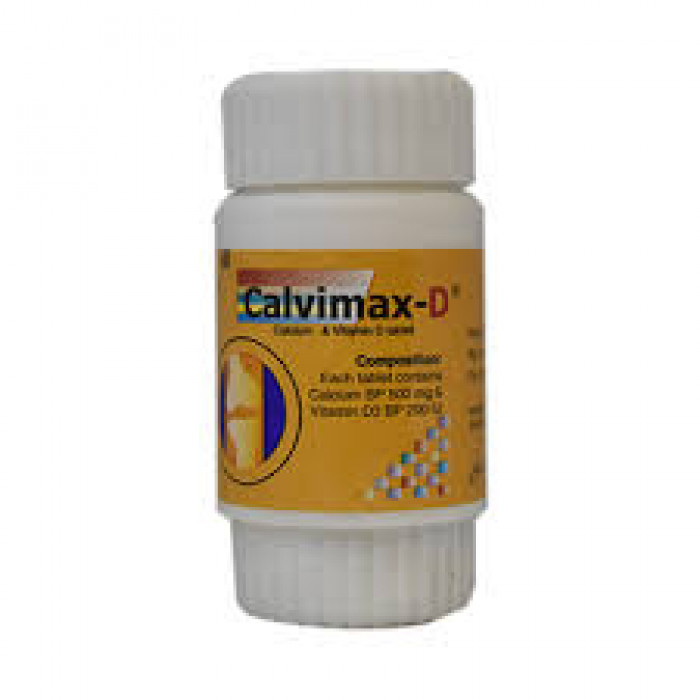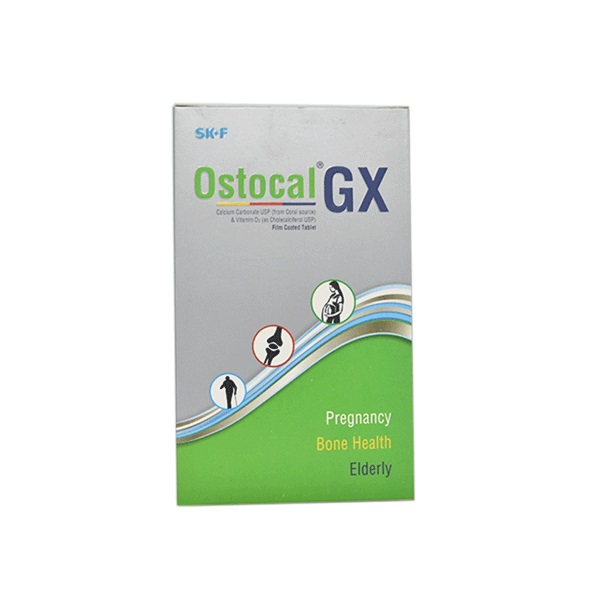
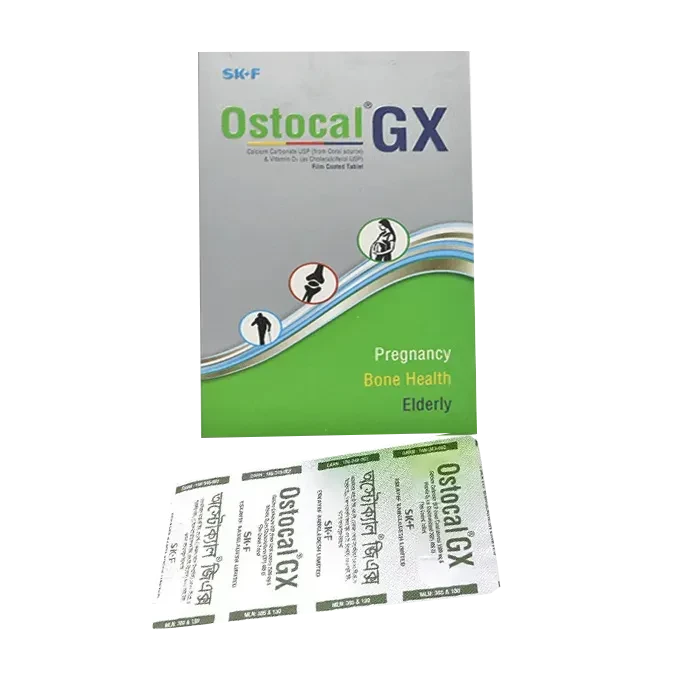
✔ 100% Authentic Product
👁️ Currently Viewing 5498
Ostocal GX (Calcium 600 mg + Vitamin D 400 IU)Tablet is a medication that contains Calcium carbonate and Vitamin D3 (cholecalciferol) and is used to prevent and treat calcium deficiency, including during pregnancy and lactation. It is also used to treat conditions such as osteoporosis, osteomalacia, rickets, and hypoparathyroidism. Patients taking Ostocal GX Tablet should monitor their plasma calcium levels regularly to avoid increased calcium levels. The medication can be used during pregnancy and breastfeeding but only under the guidance of a doctor, who can recommend appropriate dosages to prevent harm to the baby. It is not recommended for use in patients with hypervitaminosis D, kidney stones, or conditions that increase calcium levels in the blood and urine. Patients with sarcoidosis, immobilized patients with osteoporosis, malignancies, and impaired renal function should take the medication with caution. The most common side effects include nausea, vomiting, constipation, excess gas, dry mouth, loss of appetite, and acid reflux. If any side effects worsen, patients should consult their doctor.
Discount
Price: ৳ 152
MRP:
৳
160
5%
Off

100% Genuine Products, Guaranteed

Safe & Secure Payments, Always

Fast, Secure & Efficient Delivery

Proper Packaging
 Cash on Delivery - All over Bangladesh
Cash on Delivery - All over Bangladesh Regular Delivery - 12-24 Hours, Dhaka City* Charge Tk.39-59
Regular Delivery - 12-24 Hours, Dhaka City* Charge Tk.39-59 Regular Delivery - 24-48 Hours, Other Cities* Charge Tk.99-110
Regular Delivery - 24-48 Hours, Other Cities* Charge Tk.99-110
 ফ্রি ডেলিভারিঃ - ৯৯৯ টাকা+ অর্ডারে, ঢাকা
শহরে
ফ্রি ডেলিভারিঃ - ৯৯৯ টাকা+ অর্ডারে, ঢাকা
শহরে ফ্রি ডেলিভারিঃ - ২৯৯৯ টাকা+ অর্ডারে, ঢাকার
বাহিরে
ফ্রি ডেলিভারিঃ - ২৯৯৯ টাকা+ অর্ডারে, ঢাকার
বাহিরে
100% Genuine Products, Guaranteed
Safe & Secure Payments, Always
Fast, Secure & Efficient Delivery
Proper Packaging
 Cash on Delivery - All over Bangladesh
Cash on Delivery - All over Bangladesh Regular Delivery - 12-24 Hours, Dhaka City* Charge Tk.39-59
Regular Delivery - 12-24 Hours, Dhaka City* Charge Tk.39-59 Regular Delivery - 24-48 Hours, Other Cities* Charge Tk.99-110
Regular Delivery - 24-48 Hours, Other Cities* Charge Tk.99-110 ফ্রি ডেলিভারিঃ - ৯৯৯ টাকা+ অর্ডারে, ঢাকা
শহরে
ফ্রি ডেলিভারিঃ - ৯৯৯ টাকা+ অর্ডারে, ঢাকা
শহরে ফ্রি ডেলিভারিঃ - ২৯৯৯ টাকা+ অর্ডারে, ঢাকার
বাহিরে
ফ্রি ডেলিভারিঃ - ২৯৯৯ টাকা+ অর্ডারে, ঢাকার
বাহিরে
✅ Description:
Among other conditions, Osteocal DX is used to treat osteoporosis, osteomalacia, rickets, tetany, and parathyroid abnormalities. In circumstances like pregnancy and nursing, osteogenesis, and tooth development (in addition to definitive treatment), anti-seizure drug therapy, vitamin D supplement, and calcium supplements are routinely utilized to maintain appropriate food intake. It is also used as a supplement and phosphate binder in chronic renal failure.
Safety Advices

Alcohol
CONSULT YOUR DOCTOR
It is not known whether it is safe to consume alcohol with Ostocal GX Tablet. Please consult your doctor.

Pregnancy
CONSULT YOUR DOCTOR
Information regarding the use of Ostocal GX Tablet during pregnancy is not available. Please consult your doctor.

Breastfeeding
CONSULT YOUR DOCTOR
Information regarding the use of Ostocal GX Tablet during breastfeeding is not available. Please consult your doctor.

Driving
CAUTION
It is not known whether Ostocal GX Tablet alters the ability to drive. Do not drive if you experience any symptoms that affect your ability to concentrate and react.

Kidney
CONSULT YOUR DOCTOR
There is limited information available on the use of Ostocal GX Tablet in patients with kidney disease. Please consult your doctor.

Liver
CONSULT YOUR DOCTOR
There is limited information available on the use of Ostocal GX Tablet in patients with liver disease. Please consult your doctor.
✔️ Uses of Ostocal GX Tablet
Used to prevent and treat:
- Low levels of calcium in the blood (mainly occur during pregnancy and lactation period)
- Osteoporosis (brittle bones)
- Osteomalacia (softening of bones)
- Rickets (abnormal calcification, softening, and distortion of the bones typically resulting in bowlegs)
- Hypoparathyroidism
- Malnutrition due to poor nutritional intake
✔️ How Ostocal GX Tablet works?
Ostocal GX Tabletcontains vitamin D3 and calcium carbonate. Vitamin D3 helps to enhance the intestinal absorption of calcium. Calcium carbonate acts as a calcium supplement. The combination of calcium carbonate and Vitamin D3 helps to counteract the increase in parathyroid hormone that is caused by calcium deficiency and which causes increased bone resorption (destruction of bone tissue that promotes bone loss). This helps to strengthen the bones, teeth, and muscle functions.
✔️ Side Effects of Ostocal GX Tablet
- Nausea, vomiting
- Constipation
- Excess gas
- Irritability
- Loss of appetite
- Dry mouth
- Acid reflux
✔️ Quick Suggestions:
- Ostocal GX Tablet is prescribed to fulfill your nutritional requirement and to prevent any related diseases.
- Inform your doctor if you have kidney problems, or if you have ever had kidney stones.
- Let your doctor know if you are taking any other medications like antihypertensives, antibiotics, or medicines for heart disease or bone disorders.
✔️ Indication
Calcium and Vitamin D are used for the treatment of:
• Osteoporosis
• Osteomalacia
• Rickets
• Tetany
• Parathyroid disease etc
✔️ Pharmacology
This is the process for creating calcium carbonate and vitamin D3 (Cholecalciferol). Numerous body functions, including bone growth and maintenance, depend on calcium. Vitamin D3 facilitates calcium absorption and reabsorption. Additionally, vitamin D3 supports the growth of bones. Clinical studies have demonstrated that calcium and vitamin D3 together help in bone growth, osteoporosis prevention, and bone fracture prevention.
✔️ Dosage & Administration of Ostocal GX Tablet
One tablet in the morning and one tablet at night or as directed by the Physician.
Take Ostocal GX Tablet as advised by your doctor. Swallow Ostocal GX Tablet with a glass of water. Do not crush or chew the medicine unless your doctor has advised you to do. Your doctor will decide the correct dose, and duration of treatment based upon your age, body weight, and severity of present conditions.
✔️ Interaction
When used in conjunction, tetracycline may not absorb as well. Systemic corticosteroids may impair calcium absorption when used together. Calcium excretion from the urine may be reduced by thiazide diuretics. Ion-exchange resin use in conjunction with vitamin D absorption may be reduced. When receiving medication with calcium and vitamin D, hypercalcemia may make cardiac glycosides more hazardous; therefore, keep an eye on your ECG and blood calcium levels. Digoxin, tetracycline, doxycycline, minocycline, or oxytetracycline may interact with it. It may also interfere with antacids containing calcium, aluminum, magnesium, calcitriol, and other vitamin D3 supplements. It is recommended to administer sodium fluoride or bisphosphonate at least 3 hours before calcium-containing preparations.
✔️ Contraindications
Hypercalcaemia, hyperthyroidism, renal calculi and nephrolithiasis, and Zollinger-Ellison Syndrome are all contraindications.
✔️ Pregnancy & Lactation
Taking this medication during pregnancy is safe as long as the recommended doses are followed. It is important to note that the daily dose of calcium should not exceed 1500 mg and the daily dose of vitamin D should not exceed 600 IU during pregnancy. Studies on animals have shown that high doses of vitamin D can have toxic effects on reproduction. Pregnant women should avoid any calcium or vitamin D overdoses, as prolonged hypercalcemia during pregnancy may result in physical and mental development retardation, supra valvular aortic stenosis, and retinopathy in the child. However, there are no indications that therapeutic doses of vitamin D3 are teratogenic in humans.
✔️ Precautions & Warnings
- If hypercalcemia occurs, stopping the use of calcium salts is typically enough to bring calcium levels back to normal.
- However, caution should be taken when using calcium salts in patients with sarcoidosis, renal or cardiac disease, and those taking cardiac glycosides.
- Patients who have previously formed stones should increase their fluid intake.
- Calcium and vitamin D supplements should be taken according to the recommended daily allowance during pregnancy and lactation, as they are found in human breast milk.
✔️ Storage Conditions
Keep in a dry place away from light and heat. Keep out of the reach of children.
⚠️Disclaimer:
At ePharma, we’re committed to providing accurate and accessible health information. However, all content is intended for informational purposes only and should not replace medical advice from a qualified physician. Please consult your healthcare provider for personalized guidance. We aim to support, not substitute, the doctor-patient relationship.




